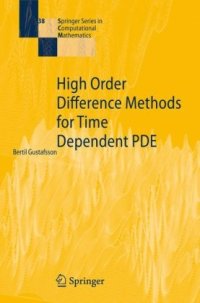
Ebook: High Order Difference Methods for Time Dependent PDE
Author: Bertil Gustafsson (auth.)
- Tags: Computational Mathematics and Numerical Analysis, Partial Differential Equations
- Series: Springer series in computational mathematics 38
- Year: 2008
- Publisher: Springer-Verlag Berlin Heidelberg
- City: Berlin
- Edition: 1
- Language: English
- pdf
Many books have been written on ?nite difference methods (FDM), but there are good reasons to write still another one. The main reason is that even if higher order methods have been known for a long time, the analysis of stability, accuracy and effectiveness is missing to a large extent. For example, the de?nition of the formal high order accuracy is based on the assumption that the true solution is smooth, or expressed differently, that the grid is ?ne enough such that all variations in the solution are well resolved. In many applications, this assumption is not ful?lled, and then it is interesting to know if a high order method is still effective. Another problem that needs thorough analysis is the construction of boundary conditions such that both accuracy and stability is upheld. And ?nally, there has been quite a strongdevelopmentduringthe last years, inparticularwhenit comesto verygeneral and stable difference operators for application on initial–boundary value problems. The content of the book is not purely theoretical, neither is it a set of recipes for varioustypesof applications. The idea is to give an overviewof the basic theoryand constructionprinciplesfor differencemethodswithoutgoing into all details. For - ample, certain theorems are presented, but the proofs are in most cases left out. The explanation and application of the theory is illustrated by using simple model - amples.
The subject of this book is high order finite difference methods for time dependent PDE. The idea is to give an overview of the basic theory and construction principles by using model examples. The book also contains a general presentation of the techniques and results for well-posedness and stability, with inclusion of the three fundamental methods of analysis both for PDE in its original and discretized form: the Fourier transform, the eneregy method and the Laplace transform. Various types of wave propagation problems are treated in specific detail since high order methods are particularly effective for these problems.